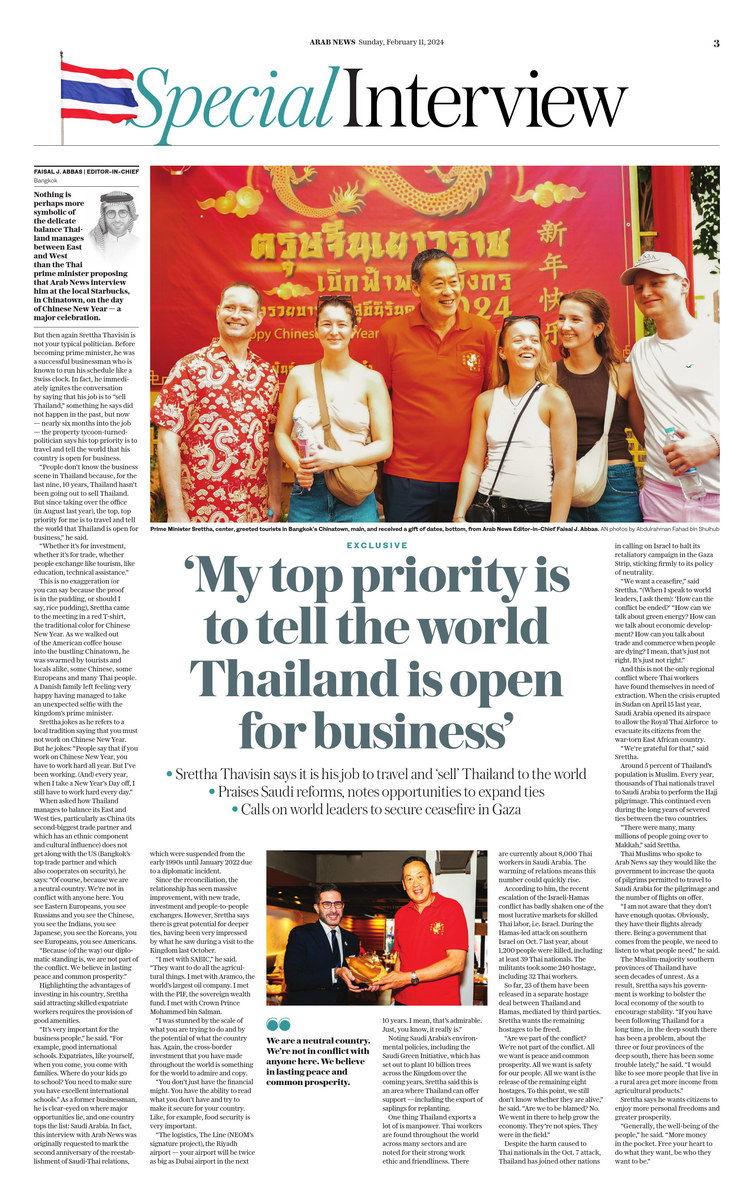BANGKOK: Nothing is perhaps more symbolic of the delicate balance Thailand manages between East and West than the Thai prime minister proposing that Arab News interviews him at the local Starbucks, in Chinatown, on the day of Chinese New Year — a major celebration.
But then again Srettha Thavisin is not your typical politician. Before becoming prime minister, he was a successful businessman who is known to run his schedule like a Swiss clock. In fact, he immediately ignites the conversation by saying that his job is to “sell Thailand,” something he says did not happen in the past, but now — nearly six months into the job — the property tycoon-turned-politician says his top priority is to travel and tell the world that his country is open for business.
“People don’t know the business scene in Thailand because, for the last nine, ten years, Thailand hasn’t been going out to sell Thailand. But since taking over the office (in August last year), the top, top priority for me is to travel and tell the world that Thailand is open for business,” he said.
“Whether it’s for investment, whether it’s for trade, whether people exchange like tourism, like education, technical assistance.”
This is no exaggeration (or you can say because the proof is in the pudding, or should I say, rice pudding), Srettha came to the meeting in a red T-shirt, the traditional color for Chinese New Year. As we walked out of the American coffee house into the bustling China Town, he was swarmed by tourists and locals alike, some Chinese, some Europeans and many Thai people. A Danish family left feeling very happy having managed to take an unexpected selfie with the kingdom’s prime minister.
Srettha jokes as he refers to a local tradition saying that you must not work on Chinese New Year. But he jokes: “People say that if you work on Chinese New Year, you have to work hard all year. But I’ve been working. (And) every year, when I take a New Year’s Day off, I still have to work hard every day.”
When asked how Thailand manages to balance its East and West ties, particularly as China (its second-biggest trade partner and which has an ethnic component and cultural influence) does not get along with the US (Bangkok’s top trade partner and which also cooperates on security), he says: “Of course, because we are a neutral country. We’re not in conflict with anyone here. You see Eastern Europeans, you see Russians and you see the Chinese, you see the Indians, you see Japanese, you see the Koreans, you see Europeans, you see Americans.
“Because (of the way) our diplomatic standing is, we are not part of the conflict. We believe in lasting peace and common prosperity.”

Thai PM Srettha Thavisin was part of the ASEAN delegation in the meeting of Gulf Cooperation Council (GCC) and Association of Southeast Asian Nations leaders in Riyadh last October. For PM Srettha, his top priority is to travel and tell the world that his country is open for business.
(SPA photo)
Highlighting the advantages of investing in his country, Srettha said attracting skilled expatriate workers requires the provision of good amenities.
“It’s very important for the business people,” he said. “For example, good international schools. Expatriates, like yourself, when you come, you come with families. Where do your kids go to school? You need to make sure you have excellent international schools.”
As a former businessman, he is clear-eyed on where major opportunities lie, and one country tops the list: Saudi Arabia. In fact, this interview with Arab News was originally requested to mark the second anniversary of the reestablishment of Saudi-Thai relations, which were suspended from the early 1990s until January 2022 due to a diplomatic incident.
Since the reconciliation, the relationship has seen massive improvement, with new trade, investment and people-to-people exchanges. However, Srettha says there is great potential for deeper ties, having been very impressed by what he saw during a visit to the Kingdom last October.
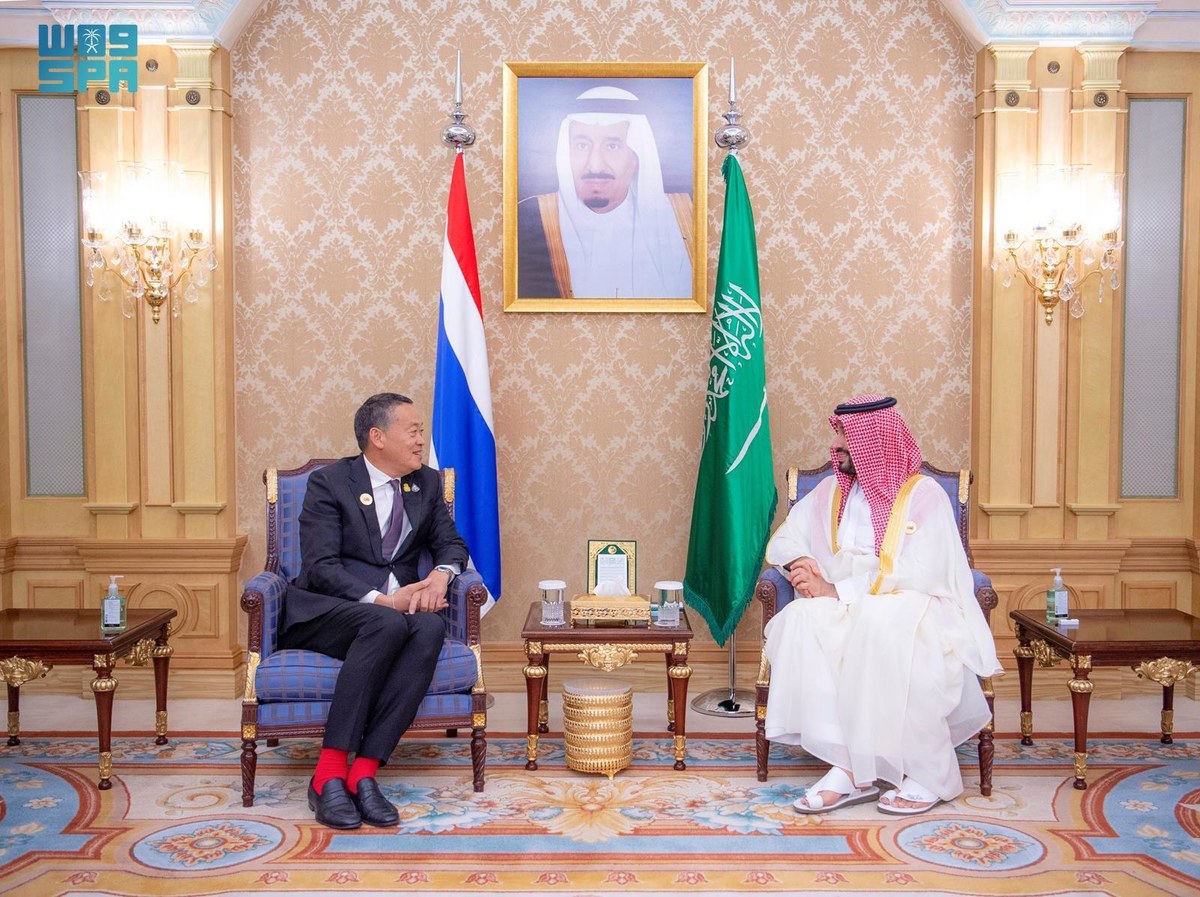
Saudi Crown Prince Mohammed bin Salman met Thailand's Prime Minister Srettha Thavisin on the sidelines of the GCC-ASEAN Summit in Riyadh on October 20, 2023. (SPA/File photo)
“I met with SABIC,” he said. “They want to do all the agricultural things. I met with Aramco, the world’s largest oil company. I met with the PIF, the sovereign wealth fund. I met with Crown Prince Mohammed bin Salman.
“I was stunned by the scale of what you are trying to do and by the potential of what the country has. Again, the cross-border investment that you have made throughout the world is something for the world to admire and copy.
“You don’t just have the financial might. You have the ability to read what you don’t have and try to make it secure for your country. Like, for example, food security is very important.
“The logistics, The Line (NEOM’s signature project), the Riyadh airport — your airport will be twice as big as Dubai airport in the next 10 years. I mean, that’s admirable. Just, you know, it really is.”
Noting Saudi Arabia’s environmental policies, including the Saudi Green Initiative, which has set out to plant 10 billion trees across the Kingdom over the coming years, Srettha said this is an area where Thailand can offer support — including the export of saplings for replanting.
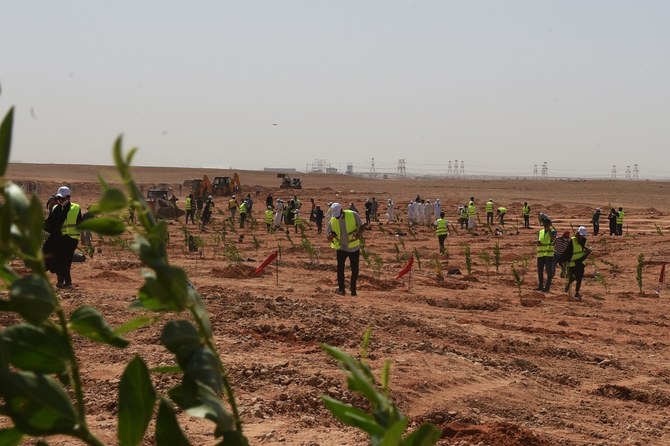
Saudi Arabia's greening project targets growing 10 billion trees under the Saudi Green Initiative. (Supplied)
One thing Thailand exports a lot of is manpower. Thai workers are found throughout the world across many sectors and are noted for their strong work ethic and friendliness. There are currently about 8,000 Thai workers in Saudi Arabia. The warming of relations means this number could quickly rise.
According to him, the recent escalation of the Israeli-Hamas conflict has badly shaken one of the most lucrative markets for skilled Thai labor, i.e. Israel. During the Hamas-led attack on southern Israel on Oct. 7 last year, about 1,200 people were killed, including at least 39 Thai nationals. The militants took some 240 hostage, including 32 Thai workers.
So far, 23 of them have been released in a separate hostage deal between Thailand and Hamas, mediated by third parties. Srettha wants the remaining hostages to be freed.
“Are we part of the conflict? We’re not part of the conflict. All we want is peace and common prosperity. All we want is safety for our people. All we want is the release of the remaining eight hostages. To this point, we still don’t know whether they are alive,” he said.
“Are we to be blamed? No. We went in there to help grow the economy. They’re not spies. They were in the field.”

Thailand's Prime Minister Srettha Thavisin is seen on a display monitor as he speaks to the Thai nationals released by their Hamas captors as they arrived at Bangkok's Suvarnabhumi Airport on Nov. 30, 2023. (AFP/File)
Despite the harm caused to Thai nationals in the Oct. 7 attack, Thailand has joined other nations in calling on Israel to halt its retaliatory campaign in the Gaza Strip, sticking firmly to its policy of neutrality.
“We want a ceasefire,” said Srettha. “(When I speak to world leaders, I ask them): ‘How can the conflict be ended?’
“How can we talk about green energy? How can we talk about economic development? How can you talk about trade and commerce when people are dying? I mean, that’s just not right. It’s just not right.”
And this is not the only regional conflict where Thai workers have found themselves in need of extraction. When the crisis erupted in Sudan on April 15 last year, Saudi Arabia opened its airspace to allow the Royal Thai Airforce to evacuate its citizens from the war-torn East African country.
“We’re grateful for that,” said Srettha.
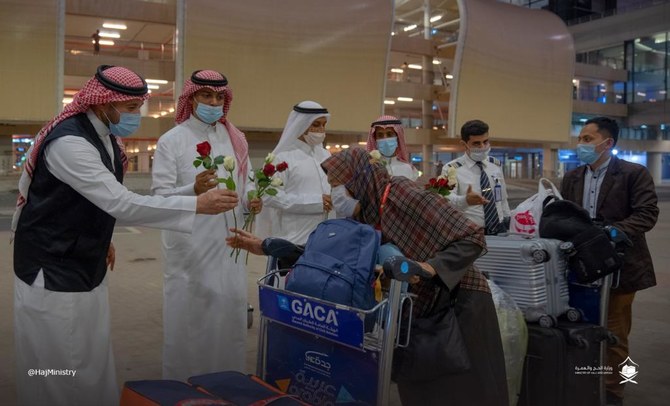
In this photo taken on March 3, 2022, Saudi officials welcome Thai pilgrims who arrived in Jeddah’s King Abdulaziz International Airport on board the first Saudia plane to fly directly from Thailand to Saudi Arabia after a three-decade hiatus. (X: @HajMinistry)
Around 5 percent of Thailand’s population is Muslim. Every year, thousands of Thai nationals travel to Saudi Arabia to perform the Hajj pilgrimage. This continued even during the long years of severed ties between the two countries.
“There were many, many millions of people going over to Makkah,” said Srettha.
Thai Muslims who spoke to Arab News say they would like the government to increase the quota of pilgrims permitted to travel to Saudi Arabia for the pilgrimage and the number of flights on offer.
“I am not aware that they don’t have enough quotas. Obviously, they have their flights already there. Being a government that comes from the people, we need to listen to what people need,” he said.
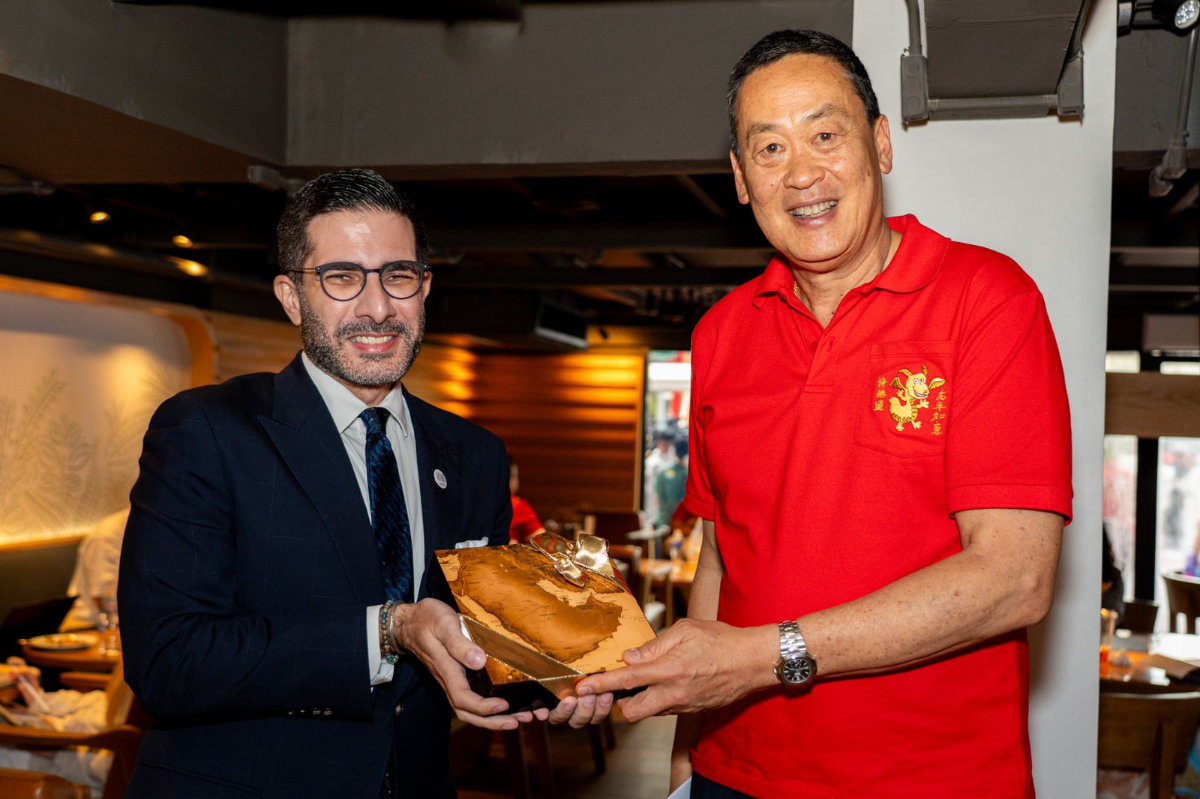
Prime Minister Srettha received a gift of dates from Arab News Editor-in-Chief Faisal J. Abbas after an interview at a Starbucks in Bangkok’s Chinatown on Saturday, Chinese New Year. (AN photo by Abdulrahman Fahad bin Shulhub)
The Muslim-majority southern provinces of Thailand have seen decades of unrest. As a result, Srettha says his government is working to bolster the local economy of the south to encourage stability.
“If you have been following Thailand for a long time, in the deep south there has been a problem, about the three or four provinces of the deep south, there has been some trouble lately,” he said.
“I would like to see more people that live in a rural area get more income from agricultural products.”
Srettha says he wants citizens to enjoy more personal freedoms and greater prosperity.
“Generally, the well-being of the people,” he said. “More money in the pocket. Free your heart to do what they want, be who they want to be.”
